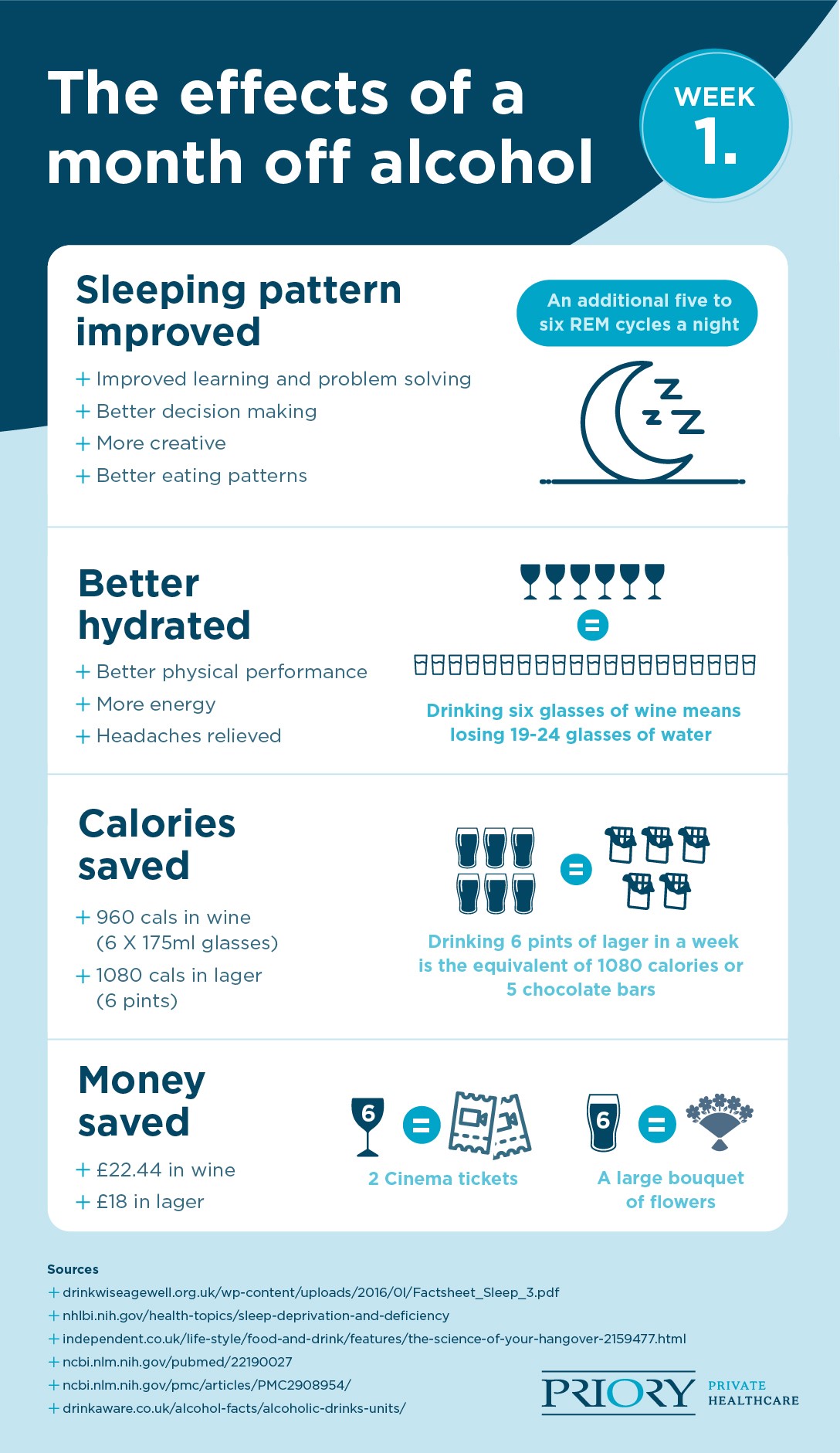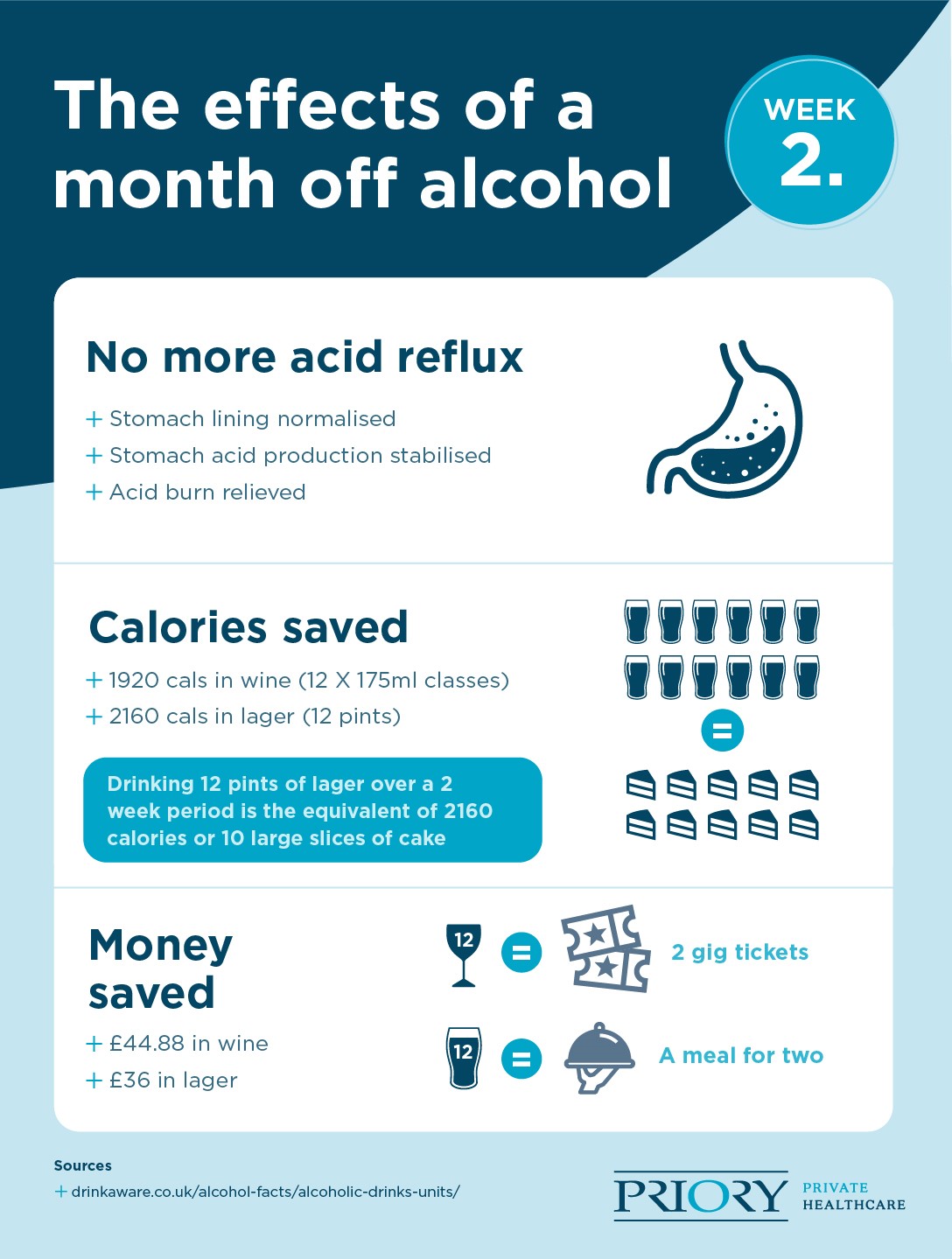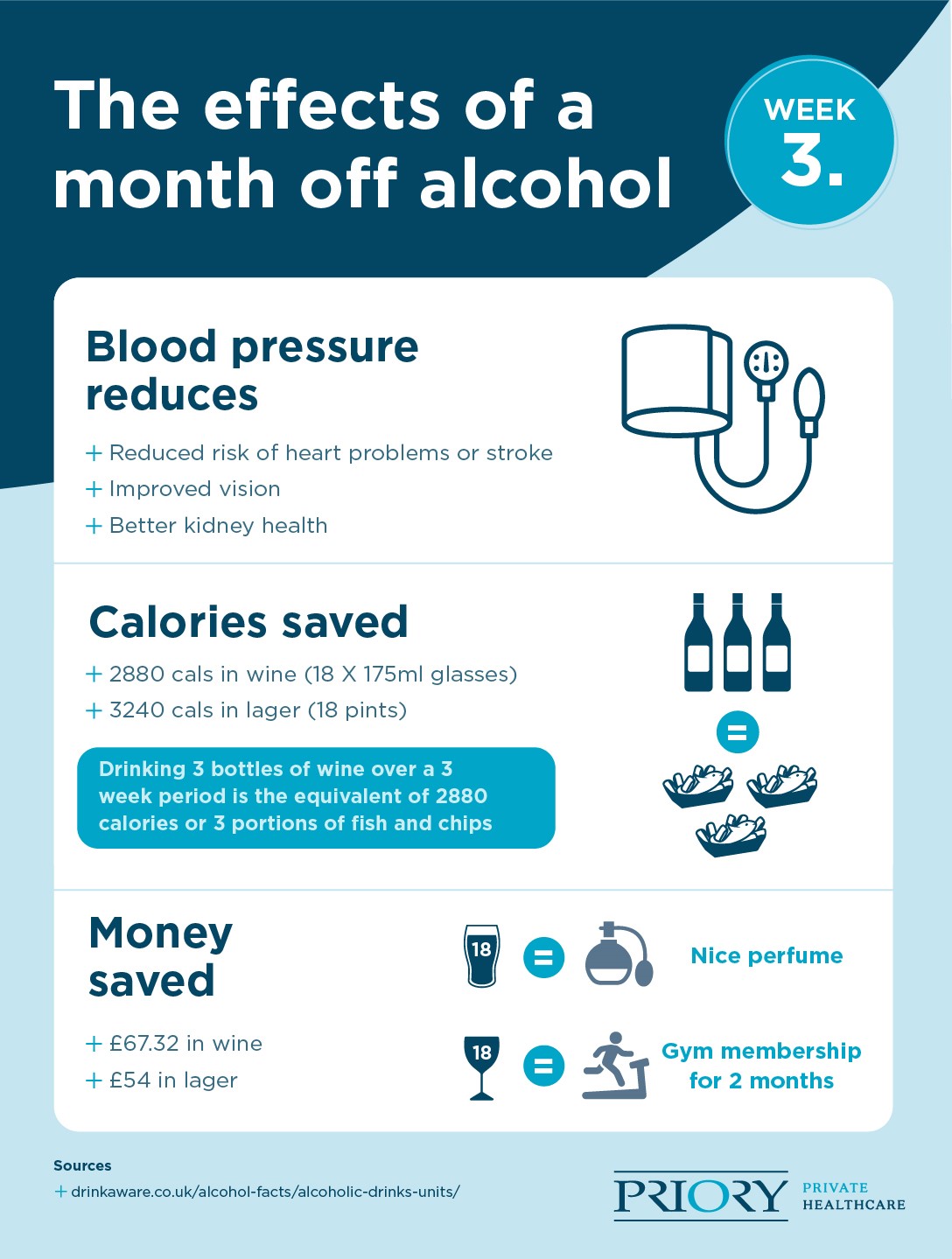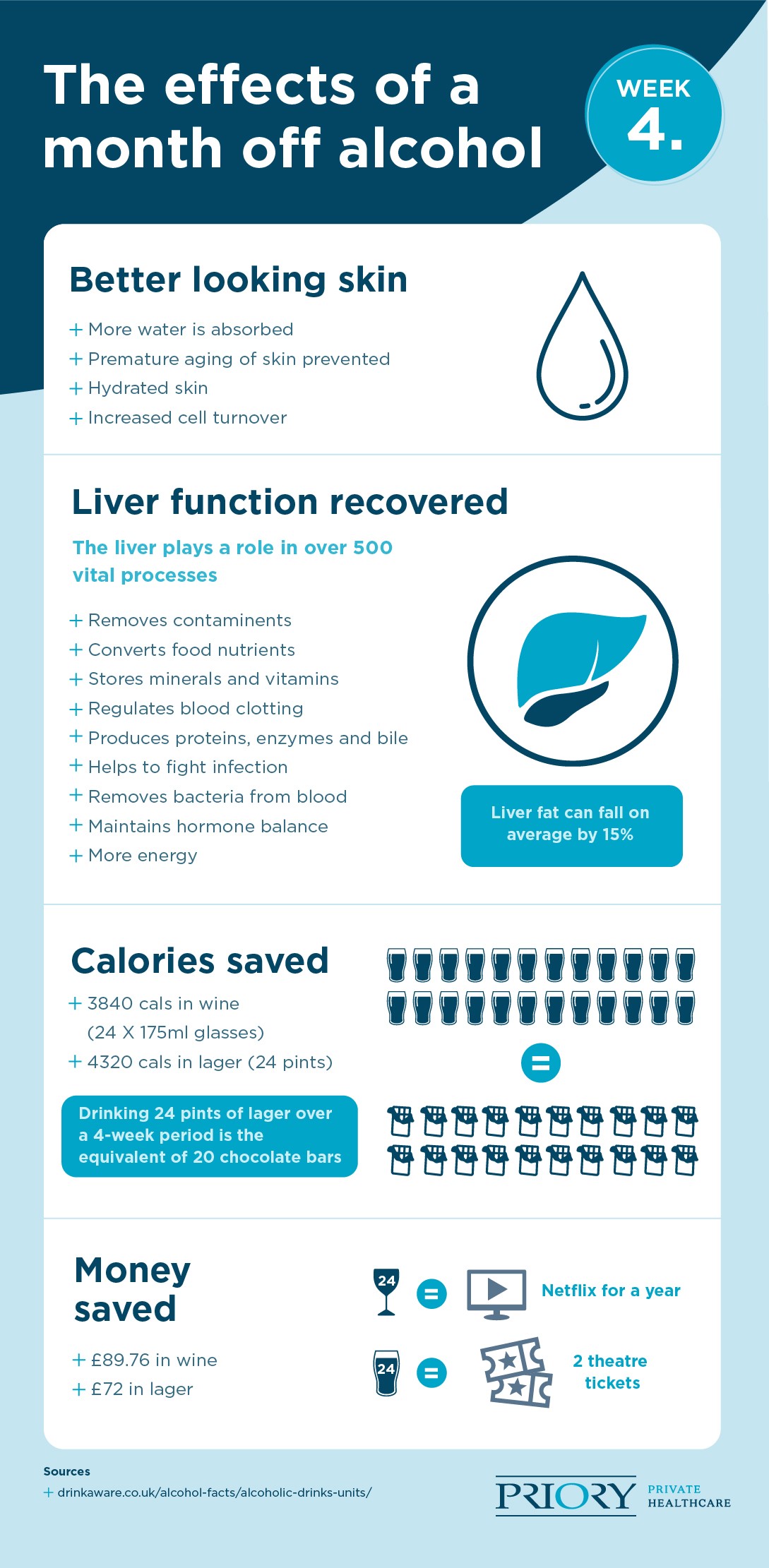The benefits of giving up alcohol for a month
Are you drinking too much? It might be time to talk to a Priory professional. Get in touch today for a free addiction assessment.
Are you drinking too much? It might be time to talk to a Priory professional. Get in touch today for a free addiction assessment.

If you're giving up alcohol for a month and are wondering what the benefits will be, we have outlined the positive changes you can expect to see.
The alcohol withdrawal timeline below gives the potential symptoms and experiences that someone who's dependent on alcohol might go through when they stop drinking.
It’s important to remember that everyone’s body will respond differently to giving up alcohol and our timeline should only be used as a guide to establish what might happen to your body when you stop drinking.
Withdrawal symptoms are likely to begin within the first 24 hours of stopping drinking. Depending on the person and how often they have been drinking, withdrawal might start from as little as 2 hours after their last drink. If you were to drink alcohol every night, the withdrawal symptoms may be more severe than someone who only drinks on weekends.
Early symptoms will be mild. They may include anxiety, hand tremors and shakes, sweating and headaches. As time goes on, alcohol cravings will grow and a feeling of fatigue and depression could begin.
For some people, more serious withdrawal symptoms will begin after 12 to 24 hours. In rare, more severe cases, you might develop delirium tremens (DTs). Symptoms could include seizures, hallucinations and a significant increase in heart rate and blood pressure. This is a dangerous period for anyone who's stopped drinking and is experiencing withdrawal.
For the majority of people, the symptoms of withdrawal will begin to subside at this point, allowing you to function more normally and manage your symptoms. Symptoms of DTs may continue for some, with a feeling of disorientation and delusions alongside other severe withdrawal symptoms like heavy sweating and high blood pressure.
After a few days of giving up drinking, most people can expect their symptoms to stop. For the more severely affected, DTs and severe withdrawal symptoms may continue. For these people, medical supervision is recommended when giving up alcohol.

After 1 week away from alcohol, you may notice that you're sleeping better. When you drink, you typically fall straight into a deep sleep, missing the important rapid eye movement (REM) phase of sleep. While you're supposed to have between six and seven cycles of REM sleep a night, you typically only have one or two when you’ve been drinking.
There are many benefits of better sleep. You will be more productive, and will be able to learn and problem solve better. Your ability to control your emotions and behaviour will also improve.
You’ll also have more opportunity to manage your food and drink intake. Sleep helps to balance the hormones that make you feel hungry or full. After drinking, your ghrelin levels (the hormone that makes you feel hungry) go up and leptin (the hormone that makes you feel full) go down.
When you drink alcohol, you lose around four times as much liquid as what you actually drank.
Dehydration can cause headaches, as your organs take water from the brain due to their own water loss. Salt and potassium levels also reduce, which can impact nerve and muscle function, while also causing headaches, fatigue and nausea.
Therefore, giving up alcohol can help you keep well hydrated, which is beneficial for your brain. Your mood and concentration will be more stable, and the frequency of headaches is likely to decrease. You also won’t suffer from the effects of dehydration such as lack of motivation and increased fatigue, so will have more energy throughout the day.
If you were to give up drinking six 175 ml glasses of wine a week, you would save around 960 calories, which is the equivalent to three burgers or five and a half bags of crisps.
And if you were to stop consuming six pints of average strength lager a week, you would save 1,080 calories, which is similar to six bags of crisps or five chocolate bars.

After 2 weeks off alcohol, you'll continue to reap the benefits of better sleep and hydration.
As alcohol is an irritant to the stomach lining, after a fortnight, you'll also see a reduction in symptoms such as reflux where the stomach acid burns your throat.
After a fortnight, you're also likely to start losing weight as a result of giving up alcohol’s empty calories. If you were to stop drinking six 175ml glasses of wine per week, you would have saved 1,920 calories at this point, and 2,160 if you’d stopped drinking around six pints of lager.

Drinking too much alcohol can cause your blood pressure to rise over time. After 3 to 4 weeks of not drinking, your blood pressure will start to reduce. Reducing your blood pressure can be crucial as it can help to lessen the risk of health problems occurring in the future.
As the calories in alcohol can cause you to gain weight, giving up alcohol can also help you to reduce your blood pressure as a result of the weight you can potentially lose. By this point, if you’d previously been drinking six 175ml glasses of wine a week, you would have lost 2,880 calories over 3 weeks. And if you’d been drinking six pints of lager a week, you would have lost 3,240 calories.

Giving up alcohol will have a positive impact on your skin due to you having better levels of hydration. As more water will have been absorbed rather than wasted, you're likely to have more hydrated-looking skin, as well as reduced dandruff and eczema.
Removing alcohol from your diet for 4 weeks can also help to improve your liver function as your liver will start to shed excess fat. If your liver function is not too badly affected by alcohol, it can recover within 4 to 8 weeks.
With the liver playing a part in over 500 vital processes, you also give your body a better chance of removing contaminants, converting food nutrients, and storing minerals and vitamins.
Giving up drinking has a wide range of great benefits to our physical and mental health, some of which are named above. Here’s an extensive list of the benefits of not drinking in the long-term:
Across the month, your body is likely to have benefited greatly from giving up alcohol. Better hydration and improved sleep will have increased your productivity and daily wellbeing. Your liver, stomach and skin will also have benefited from not dealing with alcohol. You'll also have reduced your calorie intake by 3,840 for the month, if you used to drink six glasses of 175ml wine a week, or 4,320 calories over the month if you used to drink six pints of lager a week.
If you're struggling with alcohol and are finding it hard to quit, you may want to think about getting support. We understand that embarking on recovery from alcohol addiction can be an emotionally difficult time, but we're here to help.
